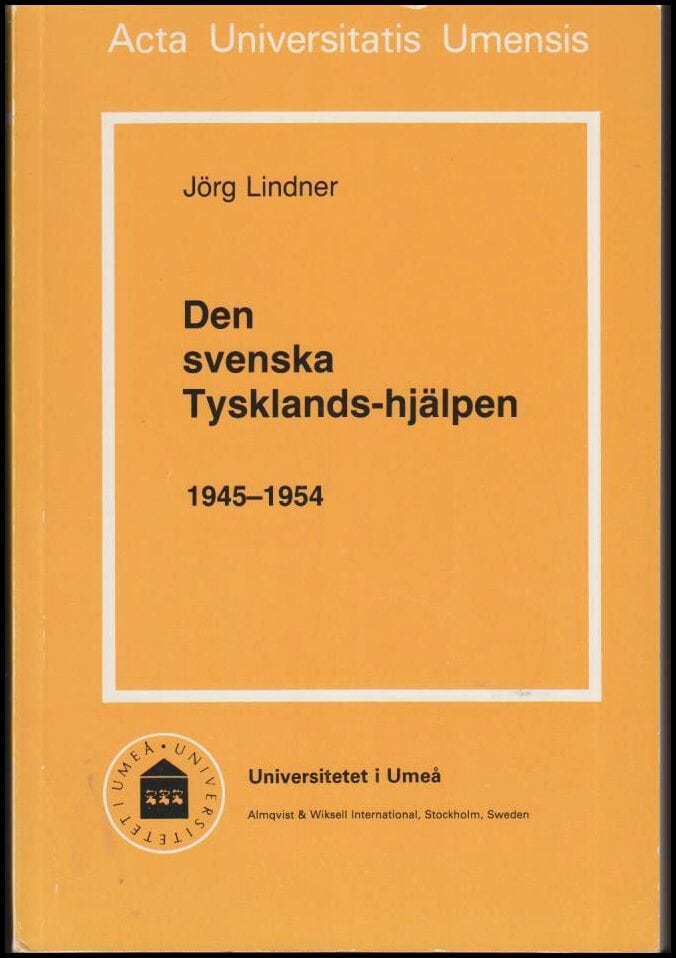
Artikeln har lagts till i varukorgen
JULETIDER! Beställningar som ska komma fram innan jul behöver läggas innan den 10 december!

Universitetet i Umeå
Antikvarisk bok | Trådhäftad Mer info →
Bindning & skick: Trådhäftad. Fint antikvariskt skick. 8:o (15-25 cm i höjd)År: 1988. Omfång: 248 s. Språk: Svenska
Läs mer om olika typer av bindningar här.
Det gick inte att ladda hämtningstillgänglighet
JULKLAPPAR? Vi rekommenderar beställning innan den 10 december för att hinna få beställningar innan jul. Obs: beakta leveranstiderna för varje bok nedan.
Endast 49 kr i fraktavgift inom Sverige, oavsett antal böcker!
Du betalar alltid endast 49 kr i fraktavgift inom Sverige, oavsett vikt eller antal böcker vid beställning av antikvariska och nya böcker från oss! Läs mer
LEVERANS: Skickas inom 1-2 vardagar.
LEVERANS: Vi skickar din beställning med Postnords Varubrev eller DHL Servicepoint.
Du betalar alltid endast 49 kr i fraktavgift inom Sverige, oavsett vikt eller antal böcker vid beställning av antikvariska och nya böcker från oss! Läs mer
ÅNGERRÄTT inom 14 dagar efter leverans.
RETUR & ÅNGERRÄTT: Du har alltid 14 dagars ångerrätt oavsett anledning, från den dagen du tar emot din leverans.
Skulle vår beskrivning av skicket på boken misstämma eller om vi på annat sätt gjort fel, står vi självfallet för returfrakten.
I KORTHET: Swedish postwar aid to Germany analyzed: from Christian charity to long-term socio-political goals.
Upptäck hur Sverige formade sin identitet genom hjälpinsatser till Tyskland efter kriget. Boken ger insikter om humanitär politik och kulturella attityder. Du får en djupare förståelse för Sveriges roll i efterkrigstiden och hur välfärdsstaten påverkade internationell hjälp. En viktig läsning för den historieintresserade!
SWEDISH POSTWAR AID to Germany from 1945 to 1954 is described and analyzed, especially as an expression of Swedish attitudes developed over a long period of societal evolution. As early as 1943/44 both Swedish voluntary agencies and the Swedish government began to plan program of postwar aid to Germany. Older and more recent attitudes to Germany, the views of Germans living in exile in Sweden and the intentions of the Western allies toward a conquered Germany were central in determining the nature and scope of Swedish aid. Programs incorporated the values of traditional Christian charity, secularized philanthropy and applied methods developed for emergency aid abroad and for social assistance at home. The new concept of the welfare state, strong in Sweden at the time, led to aid also being aimed toward long-term socio-political goals. Children, young people, mothers, refugees, displaced persons and what was regarded as the German elite were the main recipients of various aid efforts. In the atmosphere of the Cold War, aid came to be increasingly directed to West Germany. Postwar aid, with Germany as the main non-Scandinavian recipient, was Sweden's first experience as a long-term aid donor. While the efforts of voluntary agencies were concentrated abroad, the Swedish welfare state developed rapidly at home, leaving no room for privately sponsored social work. Even after 1950/54, therefore, the work of Swedish voluntary agencies was directed at needs abroad, mainly to so-called undeveloped countries outside Europe. The premises underlying such aid and its contents were largely the same as for postwar aid to Germany.
Bindning & skick: Trådhäftad. Fint antikvariskt skick. 8:o (15-25 cm i höjd) År: 1988. Omfång: 248 s. Språk: Svenska
Författare: Lindner, Jörg
Titel: Den svenska Tysklands-hjälpen
Förlag: Universitetet i Umeå
Serie: Umeå Studies in the Humanities 85
Genre: Historia
Artikelnr: 230293208
Den svenska Tysklands-hjälpen av Jörg Lindner hittar du under genren Svensk historia & arkeologi inom Historia & arkeologi i kategorin Humaniora. Hitta fler liknande böcker:
Hitta fler liknande böcker med dessa ämnesord:
